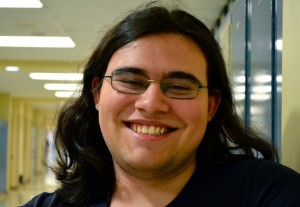Next year, students in grades three through eight and 11 will take Smarter Balanced Assessments (SBAC), set to replace the Connecticut Academic Performance Test (CAPT) in mathematics and English literacy. SBAC comes with many changes, but it also comes with concerns, staff said.
One big change is that the test will be taken on computers, which lets the test choose harder or easier questions when a student gets a question right or wrong, respectively, according to Math Department Chair Frank Corbo. For this reason, the test is untimed, Corbo said, it ends when a student is getting roughly half of all questions correct.
Of the half dozen or so staff members interviewed, some had concerns that the technology of the test was not user-friendly; in addition, they were concerned that computers would not be able to correctly grade math free response questions. They also were concerned that the tests, if too long, might be too stressful for some students.
According to Director of Secondary Education Lisabeth Comm, who described herself as undecided on SBAC, the test could take four hours for some students. Additionally, some staff had concerns that the actual test content was poorly constructed. Overall, among staff members interviewed, the majority felt negatively about the new test. Many said they felt it was being rushed and needed to be revised.
Corbo pointed to a “misleading” question about airplane arrival times as an example. In addition, one anonymous English teacher called the test “confusing.” “There appeared to be no clear instructions for students on how to answer questions,” she said.
She also had some concerns with the technology. “It’s difficult to maneuver around the screen and to read text and answer questions about it,” she said. She said that time would have to be spent teaching students the “logistics” of taking the test, which she called “a wasteful use of curricular time.”
English Department Chair Julie Heller, who supports SBAC overall, agreed with this point. As they learn to navigate the system, she said, “students will need some help.”
Furthermore, Corbo questioned a computer’s ability to differentiate between a simple mistake and a conceptual error. In contrast, CAPT free response questions are graded by humans.
“On CAPT, you can get something wrong and still get full credit if you only made a minor mistake,” Corbo said. “Is the computer really smart enough to realize the kid knows how to do the problem?”
He had some worries with the technology as well. “When somebody’s computer breaks down during the test, what’s going to happen?” he said. He is unsure whether one would have to start over. In addition, students will finish at different times, so it’s unclear what to do with the students who finish early. “You can’t start classes till all the kids are ready to go back,” Comm said. “One concern is there’s going to be a waste of time for them while the others finish.”
However, there are those who support the new tests. Heller, for example, feels that not timing the test is good. “Students should feel a bit less pressure when taking it,” she said.
She also said that taking the tests on computers will benefit schools with a “reduction in time for getting scores back.”
And Comm said SBAC is more rigorous than CAPT. She noted one eighth grade essay question that was “a slightly less arduous version of an AP language essay from a couple years ago.” Heller agrees. “The questions themselves require students to think more critically and creatively,” she said.














































